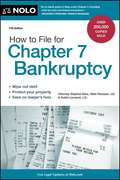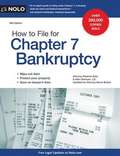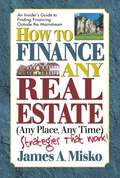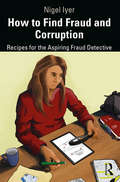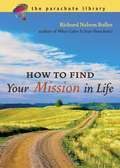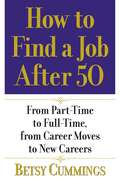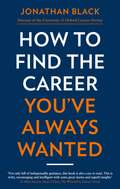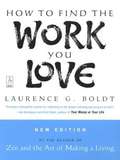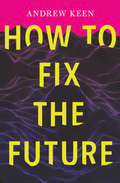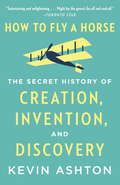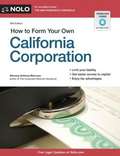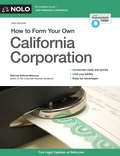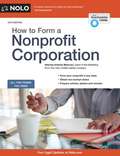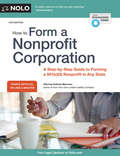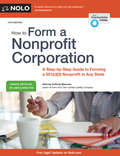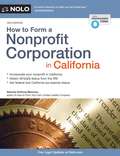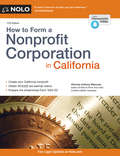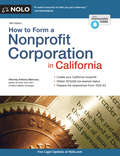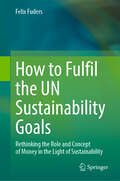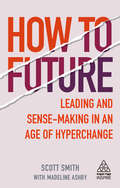- Table View
- List View
How to File for Chapter 7 Bankruptcy, 17th Edition
by Stephen EliasFind debt relief by filing bankruptcy with this all-in-one-book! If you have more debt than you can possibly pay off, the bankruptcy system is there to help -- and with How to File for Chapter 7 Bankruptcy, you'll find the clear and user-friendly information, advice and forms you need to get through the entire process. First, the book will help you determine whether you qualify for Chapter 7 -- and whether it is the best way to deal with your debts. Then you'll find out how to: stop wage garnishments and attachments cancel as much debt as possible deal with secured debts keep the maximum amount of property keep your home, if possible rebuild credit after bankruptcy The 17th edition is revised to include sample forms and figures, changes to state exemption laws (which determine what property bankruptcy filers may keep), and the latest court decisions. Plus, state and federal charts let you quickly find your states' exemption laws. Please note: This book does not cover business bankruptcies, farm reorganizations or individual repayment plans (Chapter 13). For Chapter 13 bankruptcy, see Nolo's Chapter 13 Bankruptcy.
How to File for Chapter 7 Bankruptcy, 18th Edition
by Stephen Elias Albin RenauerFile bankruptcy and find debt relief with this all in one book! When you have more debt than you can possibly pay off, the bankruptcy system is there to help and with How to File for Chapter 7 Bankruptcy, you'll find the clear and user friendly information, advice and forms you need to get through the entire process. If you're considering bankruptcy, the reliable, up to date information in How to File for Chapter 7 Bankruptcy will help you successfully complete your bankruptcy claim without breaking the bank. First, you'll find out how to determine whether you qualify for Chapter 7 and whether it's the best way to deal with your debts. Then you'll find out how to: - stop wage garnishments and attachments - fill out and file all the forms - cancel as much debt as possible - deal with secured debts - keep the maximum amount of property - keep your home, if possible - rebuild credit after bankruptcy This edition has been revised to reflect changes to state exemption laws, which determine what property you'd get to keep in bankruptcy, and the latest court decisions. You'll also get up to date legal forms, including the line by line instructions you need to fill them out. Easy to use charts make looking up your state's laws a snap. Please note: This book does not cover business bankruptcies, farm reorganizations or individual repayment plans (Chapter 13). For Chapter 13 bankruptcy, see Nolo's Chapter 13 Bankruptcy: Keep Your Property & Repay Debts Over Time.
How to File for Chapter 7 Bankruptcy: By Stephen Elias, Albin Renauer And Robin Leonard
by Albin Renauer Cara O'NeillIf you’re overwhelmed by debt, the bankruptcy system can help. How to File for Chapter 7 Bankruptcy provides the clear information and step-by-step instructions you’ll need to get through the entire process without an attorney. The book will help you determine whether you qualify for relief and whether filing for Chapter 7 bankruptcy will help you solve your debt issues. You’ll also learn how to: stop wage garnishments and lawsuits wipe out qualifying debt deal with debts you’ve secured with collateral keep as much property as possible, and rebuild credit after bankruptcy. The 21st edition includes revised instructions for all of the new user-friendly bankruptcy forms, changes to state exemption laws (which determine what property bankruptcy filers can keep), and important legal updates. Please note: This book does not cover business bankruptcies, farm reorganizations, or individual repayment plans (Chapter 13). For Chapter 13 bankruptcy, see Nolo's Chapter 13 Bankruptcy.
How to Finance Any Real Estate, Any Place, Any Time
by James A. MiskoEver wonder how real estate magnates become real estate magnates? Not by filling out mind-numbing mortgage applications! For years, successful real estate investors have used creative money strategies that circumvent banks, yet result in profitable deals. Real estate professional James Misko makes these innovative techniques available to the general public in How to Finance Any Real Estate, Any Place, Any Time.This easy-to-use guide offers more than forty-five nontraditional ways to buy properties. You will learn how to turn your dwindling stocks into real estate equities, how to acquire land without money, and so much more. If the only thing holding you back from buying your dream house or investment property is financing, maybe it&’s time to buy &“outside the box&” with How to Finance Any Real Estate, Any Place, Any Time.
How to Find Fraud and Corruption: Recipes for the Aspiring Fraud Detective
by Nigel IyerIn a typical working environment in which 'fraud and corruption' is as normal as a headache or as common as a cold, everyone in the organization has a role to play in finding and deterring fraudsters. Despite universal acknowledgement that these things may be illegal but still prevalent, managers still treat them as 'someone else's problem' or 'something that happens to other businesses, not ours’. This book shows, in simple terms, how everybody can become a successful fraud detective. A series of proven and easy-to-follow recipes show how to find the tell-tale signs of fraud and corruption and work with colleagues to deal with fraud smartly, keeping the organization you work for healthy and clean. The skills taught in this book are based on over 25 years’ experience of successfully finding and dealing with fraud and corruption, all around the world. How to Find Fraud and Corruption offers wayfinding techniques for identifying and recognizing common frauds such as: suppliers who charge too much; sharp business partners and consultants who are taking you for a ride; customers who take but prefer not to pay. It also shows how to spot and unravel more complex but equally serious and common frauds: hidden connections to dirty money centres (the illegitimate side of tax havens); bribes paid as a shortcut to get business; creative numbers fraud (inflation of sales figures or suppression of costs); conflicts of interest involving individuals inside or outside the business. The final chapter is a short story (based on a real case) which illustrates a fraud detective’s challenges, whether they are a reluctant whistleblower, someone who cannot turn a blind eye even if they would prefer to, or even the accused. Accessible and practical, this book is for everyone who wants to stop fraud, including those working in accounting and finance, management, specialist functions, such as audit, compliance and security, and anyone else who aspires to be a fraud detective and stop fraud and corruption.
How to Find Your Mission in Life (Parachute Library)
by Richard Nelson BollesNow in Paperback!In this intimate treasury of wit and wisdom, Richard Bolles, author of the job-hunting bible: WHAT COLOR IS YOUR PARACHUTE?, explores the spiritual aspects of finding one's place in the work world. For anyone who has ever wondered how to make the most of their unique natural gifts, or how to find a vocation that is both socially responsible and personally fulfilling, this enlightening and empowering little volume provides immeasurable guidance. Originally appearing as an appendix in PARACHUTE, this book has led countless people through life's most difficult passages and is sure to inspire anyone who is either new to the job market or reconsidering their place in it. A guide to exploring the spiritual aspects of finding one's mission in the workplace. Previous editions have sold 85,000 copies.
How to Find a Job After 50: From Part-Time to Full-Time, from Career Moves to New Careers
by Betsy CummingsFor all the job market uncertainty today, opportunities have never been better for Americans over fifty. So whether you've been shown the door or have decided to change your career, there is an endless array of options-if you know where to look. In this unique hands-on guide, business journalist Betsy Cummings provides even the most befuddled fifty-something with the motivation and resources that make the process painless and productive. Exploit your experience, capitalize on your contacts, and learn how to: Land an interview from an online job board, Home in on those industries and companies friendly to workforce veterans, Revamp your resume to highlight your proven track record, Find a new job at your old company, Refresh your skills with low-cost, even no-cost training, Use computer technology and the Internet to start a new career, Network among colleagues, clients, and friends, Sell your age as an asset (even if your interviewer is the age of your child!). Book jacket.
How to Find the Career You've Always Wanted: How to take control of your career plan and make it happen
by Jonathan BlackFrom the Financial Times careers adviser, this book of wisdom will help you feel more empowered about your career. You can read it from beginning to end, or dive into specific sections for immediate advice on, for example, writing your CV. 'We will certainly be recommending the book to all our parents. It's quite simply the best available' - George Fussey, Head of Career Education, Eton College'One of the most practical and comprehensible career guides ever produced' - Baroness Gillian ShephardHow to Find the Career You've Always Wanted is made up of three sections:Stepping Back - What's this all about? The bigger issues that frame the whole area of your career and jobs; looking down on your career map from 10,000 feet. Practicalities - What do I do on Monday morning? CVs, applications, interviews and all the other details on your map. Along the Way - Or, how do I keep going? How to cope with the hurdles and challenges that you might encounter while you're travelling along your route It includes an extensive set of real examples to bring it all alive, and is grounded with helpful statistics and sociological research.Jonathan Black is Director of the Careers Service at the University of Oxford. He himself has had many different jobs, including: management consultant, professional publisher, co-found of a start-up company, finance director, aerospace engineer, computer salesman and strategy direct. In this book, he dispenses wisdom accrued in the course of a long and varied career, in which he has helped many thousands find the career of their dreams.'Indispensable, inviting and engaging' - Prof Dame Carol Black, DBE, FRCP, FMedSci'A book about how to lead a happy life' - James Hodgson, Bedford School'A uniquely powerful guidebook' - Mark Byford, Egon Zehnder'The definitive careers guide' - David Palfreyman, OBE'Wise, calming and pragmatic' - Emma Jacobs, FT'A true career design compendium' - Caroline Konrad, Ryerson University'Winningly combines anecdotes, surveys and years of professional experience' - Dr Tim Hands, Winchester School'Elegant, light and humorous style' - Prof Dame Carol Black, DBE, FRCP, FMedSci'From an expert at the top of his game' - David Palfreyman, OBE
How to Find the Career You've Always Wanted: How to take control of your career plan – and make it happen
by Jonathan BlackFrom the Financial Times careers adviser, this book of wisdom will help you feel more empowered about your career. You can read it from beginning to end, or dive into specific sections for immediate advice on, for example, writing your CV. 'We will certainly be recommending the book to all our parents. It's quite simply the best available' - George Fussey, Head of Career Education, Eton College'One of the most practical and comprehensible career guides ever produced' - Baroness Gillian ShephardHow to Find the Career You've Always Wanted is made up of three sections:Stepping Back - What's this all about? The bigger issues that frame the whole area of your career and jobs; looking down on your career map from 10,000 feet. Practicalities - What do I do on Monday morning? CVs, applications, interviews and all the other details on your map. Along the Way - Or, how do I keep going? How to cope with the hurdles and challenges that you might encounter while you're travelling along your route It includes an extensive set of real examples to bring it all alive, and is grounded with helpful statistics and sociological research.Jonathan Black is Director of the Careers Service at the University of Oxford. He himself has had many different jobs, including: management consultant, professional publisher, co-found of a start-up company, finance director, aerospace engineer, computer salesman and strategy direct. In this book, he dispenses wisdom accrued in the course of a long and varied career, in which he has helped many thousands find the career of their dreams.'Indispensable, inviting and engaging' - Prof Dame Carol Black, DBE, FRCP, FMedSci'A book about how to lead a happy life' - James Hodgson, Bedford School'A uniquely powerful guidebook' - Mark Byford, Egon Zehnder'The definitive careers guide' - David Palfreyman, OBE'Wise, calming and pragmatic' - Emma Jacobs, FT'A true career design compendium' - Caroline Konrad, Ryerson University'Winningly combines anecdotes, surveys and years of professional experience' - Dr Tim Hands, Winchester School'Elegant, light and humorous style' - Prof Dame Carol Black, DBE, FRCP, FMedSci'From an expert at the top of his game' - David Palfreyman, OBE
How to Find the Combination: Meteorite Crashes and Code Breakers--Strategies for Generating Intersectional Ideas
by Frans JohanssonOnce you have broken down the associative barriers that limit out-of-the-box thinking, you will increase the chances of generating random combinations of concepts that cross fields. This chapter shows how various individuals and teams have produced truly intersectional ideas.
How to Find the Work You Love
by Laurence G. BoldtTechnological advances and the global marketplace are changing the way we live and work. Doing the work you love is the critical factor to personal fulfillment and economic success. No one understands this more than Laurence G. Boldt, whose Zen and the Art of Making a Living helped many carve out new and rewarding career paths. But how do you find the courage to start the search for a new career? And how do you tap into your own best resources to discover what you want to do and what you're good at? This remarkable guide offers simple yet profound strategies to help you answer those questions by focusing on four key elements to be sought in any life's work: Integrity, Service, Enjoyment, and Excellence. Boldt has reduced the quest for meaningful work to its essence and will lead you to an understanding of what you could and should be doing with your life. .
How to Fix Your Credit
by Luis Cortes Karin Price MuellerYou're not alone. About 51 million American households carry credit card debt at an average balance of nearly $12,000. Credit trouble is a problem you can't ignore. No matter how much money you earn or where you live, if you've made mistakes with credit in the past, those mistakes will haunt you -- unless you empower yourself to fix them. And you can. Managing your credit can be a complicated issue, but the Reverend Luis Cortés Jr. provides an easy-to-follow guide to help you handle the process. Any amount of debt, no matter how scary the number, can be paid off with a little planning and a lot of determination. The sooner you begin, the easier your task will be. Let Reverend Cortés help you today before your situation becomes worse tomorrow.
How to Fix the Future: Staying Human In The Digital Age (Books That Changed the World)
by Andrew KeenFrom data breaches to disinformation,a look at the digital revolution’s collateral damage with “practical solutions to a wide-range of tech-related woes” (TechCrunch).In this book, a Silicon Valley veteran travels around the world and interviews important decision-makers to paint a picture of how tech has changed our lives—for better and for worse—and what steps we might take, as societies and individuals, to make the future something we can once again look forward to.“A truly important book and the most significant work so far in an emerging body of literature in which technology’s smartest thinkers are raising alarm bells about the state of the Internet, and laying groundwork for how to fix it.”?Fortune“After years of giddiness about the wonders of technology, a new realization is dawning: the future is broken. Andrew Keen was among the first and most insightful to see it. The combination of the digital revolution, global hyperconnectivity, and economic dysfunction has led to a populist backlash and destruction of civil discourse. In this bracing book, Keen offers tools for righting our societies and principles to guide us in the future.”?Walter Isaacson, New York Times-bestselling author of Steve Jobs and Leonardo Da Vinci“Comparing our current situation to the Industrial Revolution, he stresses the importance of keeping humanity at the center of technology.”?Booklist“Valuable insights on preserving our humanity in a digital world.”?Kirkus Reviews (starred review)
How to Fly a Horse: The Secret History of Creation, Invention, and Discovery
by Kevin AshtonAs a technology pioneer at MIT and as the leader of three successful start-ups, Kevin Ashton experienced firsthand the all-consuming challenge of creating something new. Now, in a tour-de-force narrative twenty years in the making, Ashton leads us on a journey through humanity's greatest creations to uncover the surprising truth behind who creates and how they do it. From the crystallographer's laboratory where the secrets of DNA were first revealed by a long forgotten woman, to the electromagnetic chamber where the stealth bomber was born on a twenty-five-cent bet, to the Ohio bicycle shop where the Wright brothers set out to "fly a horse," Ashton showcases the seemingly unremarkable individuals, gradual steps, multiple failures, and countless ordinary and usually uncredited acts that lead to our most astounding breakthroughs.Creators, he shows, apply in particular ways the everyday, ordinary thinking of which we are all capable, taking thousands of small steps and working in an endless loop of problem and solution. He examines why innovators meet resistance and how they overcome it, why most organizations stifle creative people, and how the most creative organizations work. Drawing on examples from art, science, business, and invention, from Mozart to the Muppets, Archimedes to Apple, Kandinsky to a can of Coke, How to Fly a Horse is a passionate and immensely rewarding exploration of how "new" comes to be.
How to Form Your Own California Corporation
by Anthony MancusoStart a nonprofit with the forms and information you need to give back to your community! Thousands of arts groups, educators, social-service agencies and others have used How to Form a Nonprofit Corporation in California to get their organizations off the ground. With a nonprofit corporation, you'll gain recognition, save money, become eligible for grants, and protect your members and directors from liability. And you can do all of this without spending thousands on an attorney. With this easy-to-use guide, anyone can do it! How to Form a Nonprofit Corporation in California includes complete instructions for obtaining federal 501(c)(3) tax-exemption and for qualifying for public charity status with the IRS. It also provides: -line-by-line instructions for completing your application -instructions and completed sample clauses for preparing articles of incorporation -ready-to-use bylaws for membership and non-membership nonprofits -ready-to-use minutes for the organizational meeting -sheets with California's specific legal and tax requirements This edition is completely updated to cover changes to the law. You'll also get updated instructions for using Form 1023 and coverage of new online services and options related to forming your nonprofit corporation. Not a California resident? Use How to Form a Nonprofit Corporation .
How to Form Your Own California Corporation
by Anthony MancusoIncorporate your business in California Protect your personal assets By incorporating your business, you separate your personal and business assets—and shield your house, investments, and other personal assets from business creditors. There are other advantages as well, including easier access to capital, employee perks, and certain tax benefits. How to Form Your Own California Corporation offers step-by-step instructions on how to incorporate your small business in California. It shows you how to: file articles of incorporation prepare bylaws issue shares of stock, and set up a corporate records book. How to Form Your Own California Corporation makes the entire incorporation process easy. Like tens of thousands of California entrepreneurs have done over the last 30 years, you really can complete and file all the paperwork yourself. This edition is completely updated and revised to provide current regulations, tax requirements, contact information for relevant agencies, helpful resources, and the most up-to-date forms available.
How to Form Your Own California Corporation
by Anthony Mancuso AttorneyForm a corporation in California with the book that's helped thousands of Californians incorporate! Protect your business and save on attorney's fees by forming a California corporation on your own. How to Form Your Own California Corporation makes incorporating a straightforward task for any small business owner. This all-in-one guide contains the forms, tax rules, practical information, and step-by-step instructions you need to successfully incorporate a California business. Learn about: different types of California corporations and how they work filing articles of incorporation how to stay legal by keeping legally sound corporate records and minutes securities laws and exemptions corporate taxation preparing bylaws issuing stock obtaining licenses and permits perks for your employees This edition is completely updated and revised to provide current regulations, tax requirements, contact information for relevant agencies, helpful resources, and the most up-to-date forms available.
How to Form a Nonprofit Corporation (7th edition)
by Anthony MancusoMancuso, an attorney and corporations expert, explains how to form and operate a tax-exempt corporation in every state, from completing an IRS tax-exemption application and preparing articles of incorporation to filling in minutes of the organizational meeting. The seventh edition is updated to provide the latest federal and state rules. It also provides the latest forms, including the new IRS form 1023. Articles, bylaws and minutes are included as tear-outs and on CD-ROM. Annotation ©2005 Book News, Inc., Portland, OR (booknews.com)
How to Form a Nonprofit Corporation (National Edition): A Step-by-Step Guide to Forming a 501(c)(3) Nonprofit in Any State
by Anthony MancusoForm a 501(c)(3) tax-exempt nonprofit in your state The process of becoming a tax-exempt organization may appear intimidating, but with How to Form a Nonprofit Corporation, you can do it quickly, easily, and with confidence. You’ve got a cause you care about—now you just need the legal status that will help your organization raise money and work for that cause. Here, you’ll find all the forms and information you need to turn your group into a tax-exempt nonprofit. With How to Form a Nonprofit Corporation, you can form a nonprofit corporation in any state and gain 501(c)(3) tax-exempt status with the IRS. We provide step-by-step instructions for both IRS Form 1023 and the streamlined Form 1023-EZ federal tax-exemption application for smaller nonprofits. Learn how to: choose a legal name prepare articles of incorporation and bylaws for your nonprofit obtain federal and state tax-exempt status fill in minutes of the organizational meeting, and establish a corporate records book. This edition reflects the latest changes in the law, and includes contact information for finding updated state-specific instructions. It also provides information on B (benefit) corporations and other hybrid nonprofit entities that are allowed to both do good and make a profit.
How to Form a Nonprofit Corporation (National Edition): A Step-by-Step Guide to Forming a 501(c)(3) Nonprofit in Any State
by Anthony MancusoForm a 501(c)(3) tax-exempt nonprofit in your state You’ve got a cause you care about—now you just need the legal status that will help your organization raise money and work for that cause. Here, you’ll find all the forms and information you need to create a tax-exempt nonprofit for your group. Learn how to form a nonprofit corporation in any state and gain 501(c)(3) tax-exempt status with the IRS. We provide step-by-step instructions for both IRS Form 1023 and the streamlined Form 1023-EZ federal tax-exemption application. With this book you can: choose a legal name prepare articles of incorporation create your own bylaws obtain federal and state tax-exempt status prepare minutes for your organizational meeting, and establish a corporate records book. All forms are downloadable through a special link in the book.
How to Form a Nonprofit Corporation in California
by Anthony MancusoStart a nonprofit corporation with the forms and information you need to give back to your community! Thousands of arts groups, educators, social service agencies and others have used How to Form a Nonprofit Corporation in California to get their organizations off the ground. With a nonprofit corporation, you'll gain recognition, save money, become eligible for grants, and protect your members and directors from liability. And you can do all of this without spending thousands on an attorney. With this easy to use guide, anyone can do it! How to Form a Nonprofit Corporation in California includes complete instructions for obtaining federal 501(c)(3) tax exemption and for qualifying public charity status forming a California nonprofit corporation, with the IRS. It also provides: . line by line instructions for completing your application . instructions and completed sample clauses for preparing articles of incorporation . ready to use bylaws for membership and non membership nonprofits . ready to use minutes for the organizational meeting . sheets with California's specific legal and tax requirements This edition is completely updated to cover changes to the law. You'll also get updated instructions for using Form 1023 and coverage of new online services and options related to forming your nonprofit corporation. Forms are available to download at nolo.com.
How to Form a Nonprofit Corporation in California
by Anthony MancusoForm a California nonprofit corporation Tens of thousands of arts groups, educators, social service agencies, environmental groups and others have used this bestselling book to form their California nonprofit. Your group can, too. Obtaining 501(c)(3) tax-exempt status has just become a lot easier with the new IRS Form 1023-EZ streamlined application. Use this book to form your California nonprofit corporation and obtain your federal and state tax exemptions. We provide step-by-step instructions for both the Form 1023 and the new easier Form 1023-EZ. How to Form a Nonprofit Corporation in California shows you how to: choose a corporate name and structure prepare and file nonprofit articles with the state of California qualify as a 501(c)(3) public charity obtain your federal and California tax exemptions create bylaws set up a corporate records book prepare minutes of your first board meeting and handle postincorporation filings and tasks. This new edition is completely updated to cover changes to the law.
How to Form a Nonprofit Corporation in California
by Anthony MancusoForm a California nonprofit corporation <P><P> Tens of thousands of arts groups, educators, social service agencies, environmental groups and others have used this bestselling book to form their California nonprofit. Your group can, too. <P><P> Obtaining 501(c)(3) tax-exempt status is a lot easier now with the IRS Form 1023-EZ streamlined application. Use this book to form your California nonprofit corporation and obtain your federal and state tax exemptions. We provide step-by-step instructions for both the longer IRS Form 1023 and the streamlined IRS Form 1023-EZ application. <P><P> How to Form a Nonprofit Corporation in California shows you how to: <br> choose a corporate name and structure <br> prepare and file articles of incorporation <br> qualify as a 501(c)(3) public charity <br> obtain federal and state tax-exempt status <br> create bylaws <br> set up a corporate records book <br> prepare minutes of your first board meeting and <br> handle post incorporation filings and tasks. <P><P> This new edition is completely updated to cover changes to the law.
How to Fulfil the UN Sustainability Goals: Rethinking the Role and Concept of Money in the Light of Sustainability
by Felix FudersThis book combines the field of economics —especially monetary theory— with other disciplines like ecology, physics, humanities, social sciences and development theory. This transdisciplinary approach makes the book a unique contribution for researchers, students, policy makers and professionals working in governmental or nongovernmental institutions, as well as anyone interested in society’s well-being and achieving a true social-ecological transformation. It is written in an accessible language in order to reach a broad audience. In 2015, more than 190 world leaders recognized that the world is on a “collision course” (Max-Neef) and committed to 17 Sustainable Development Goals (SDGs). Many conferences and high-level meetings have been held since then, and one of the most frequently discussed topics is how to finance these goals. There is a widespread belief that coming up with more money for sustainable development will “do the trick”. Usually, the discussions focus on finding additional financial resources in order to achieve the goals faster. In this book it is argued that not only is more money needed, but it needs to be a different kind of money. The book demonstrates that ALL but one of the SDGs are directly linked to our monetary system, which —being completely unnatural— can be seen as the most important, but at the same time least recognized, reason for market failure. Many people think we just need to do more, faster, better. Very few say that we have done things fundamentally wrong and that the institutions and values which motivated us to do those things need to be changed. It will be concluded that only if we change our unnatural design of money to a more natural one, will we be able to reach these goals
How to Future: Leading and Sense-making in an Age of Hyperchange (Kogan Page Inspire)
by Scott Smith Madeline AshbyApproach the future as a conversation, not a declaration.How can you be prepared for what's next when emerging trends constantly threaten to turn your strategic plan on its head? The world of business is experiencing a state of hyperchange influenced by global movements, disruptive technologies, political uprisings and new consumer expectations. If your world is turned upside down, will you know how to pivot and thrive, or will you be roadkill in the 'adapt or die' business race? Futuring is the art of anticipating and testing the trade-offs of different futures by making sense of key trends, signals and emerging patterns. How to Future is the only book that will teach you how to become a strategy wayfinder, allowing you to evaluate, plan and prepare for better futures for you and your business. How to Future is a guidebook to futuring and arms you with tools, strategies and practices that illuminate new strategic pathways. Renowned futurists Scott Smith and Madeline Ashby teach you how to manage the daily flood of information and signals, and discern emergent patterns that have a direct impact on the direction of your business. How to Future isn't about the "one future" you expect. Instead, this book equips you with valuable tools and concepts, builds a future-focused mindset and enables you to envision, stress-test and prototype adaptable, informed and agile strategic visioning. These tools will empower you, your team and your organization to anticipate whatever futures emerge.
